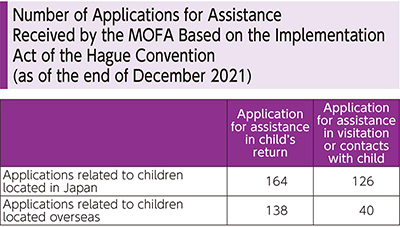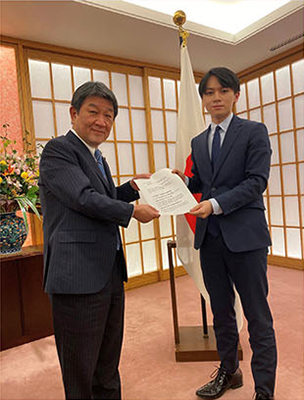Diplomatic Bluebook 2022
Chapter 4
Japan's Diplomacy Open to the Public
4 The Convention on the Civil Aspects of International Child Abduction (the Hague Convention) and its Implementation
The Hague Convention is designed as an international mechanism for addressing disputes arising from the wrongful removal or retention of children across borders in the belief that the interests of children are of paramount importance. It requires cooperation between Contracting States to the Convention for returning children to their state of habitual residence and establishing opportunities for transboundary parent-child access.
This Convention came into force in Japan on April 1, 2014. As of December 31, 2021, 101 countries including Japan are parties to the Convention.
The Convention is implemented through mutual cooperation among the governmental agencies designated as the Central Authority in Contracting States to the Convention. In Japan, MOFA as the Central Authority avails itself of experts in various fields and provides assistance to both the parent whose child was removed and the parent who removed the child for the resolution of child removal cases, in communication and cooperation with foreign Central Authorities.
In the seven years and nine months between the entry into force of the Convention and the end of December 2021, MOFA received a total number of 468 applications: 302 applications seeking the return of the child and 166 applications seeking access to the child. Of the cases seeking the return of the child from Japan to another country, children were returned in 55 cases and conclusions were reached not to return the child in 43 cases. Of the cases requesting the return of the child from another country to Japan, children were returned in 53 cases and conclusions were reached not to return the child in 29 cases.
In March 2021, MOFA, together with the Hague Conference on Private International Law, co-hosted the “Web Seminar on the 1980 Hague Convention in the Asia Pacific” with a view to strengthening cooperation in the Asia-Pacific region on the Hague Convention. It was attended by judges and officials of Central Authorities from 12 countries and regions.
In addition, in order to make the Hague Convention known to a broad public, MOFA sent leaflets on the Hague Convention (electronic version) to our Embassies and Consulates and posted them on our websites. It also holds online seminars to raise awareness among Japanese nationals living overseas, as well as seminars in Japan for local governments and relevant institutions such as bar associations. MOFA also puts efforts into PR activities by creating awareness-raising videos on the Hague Convention and posting them on MOFA's website and video-sharing platforms.

 The author (right) submitting the request on measures to address loneliness and isolation among Japanese nationals abroad, to Foreign Minister Motegi
The author (right) submitting the request on measures to address loneliness and isolation among Japanese nationals abroad, to Foreign Minister MotegiIn February, Japan appointed a Minister for Loneliness and Isolation and launched measures to counter the issue. Even before the COVID-19 pandemic, Japan was already facing a serious situation with regard to problems such as suicide, child abuse, and domestic violence (DV). One of the factors behind this situation was the “undesirable loneliness” that came from not having anyone to rely on. However, this problem further manifested when interpersonal bonds were cut off during the COVID-19 pandemic.
We have set up a chat consultation service that everyone can use free of charge and anonymously regardless of their age and sex, and which offers advice and support around the clock, every day of the year, to those facing “undesirable loneliness.” With volunteer counselors living overseas participating in this activity, we have built a 24-hour consultation support system by having these volunteers respond to consultations during the night and late-night hours when the number of consultations reaches its peak. In March, soon after our proposal for the government to work as one to address loneliness and isolation was accepted and the corresponding measures were launched in Japan, the counselors received a consultation from a Japanese child living abroad who was being abused by a parent. Due to the nature of chat consultations, although we had previously received consultations from Japanese nationals overseas, this was the first time we had received a consultation that called for emergency response (crisis intervention in collaboration with child consultation centers, police and other parties). However, Japan's child consultation centers are unable to respond to child abuse cases involving Japanese nationals overseas, and we were also unable to encourage inquirers who did not understand the local language to approach the local authorities and support organizations for assistance. Moreover, private-sector consultation services like ours did not have a system for communicating with MOFA or diplomatic missions overseas. We were literally at our wits' end.
 A 24-hour consultation support center in Tokyo
A 24-hour consultation support center in TokyoOf course, problems such as suicide, child abuse, and DV also arise among Japanese nationals overseas. This group is particularly susceptible to loneliness and isolation partly because they face difficulties such as language and cultural barriers as well as differences in lifestyles. In fact, the second most common cause of death for Japanese nationals overseas is suicide (Source: 2020 Statistics on Assistance Provided by MOFA to Japanese Nationals Overseas). MOFA provides various forms of assistance through its diplomatic missions overseas, but it is necessary to further strengthen measures, including cooperation with private organizations, to address the problem of loneliness and isolation among Japanese nationals overseas. In view of that, we submitted a request to Foreign Minister Motegi on measures to address loneliness and isolation among Japanese nationals overseas, and proposed that MOFA commence reviews on concrete measures. As a result, since July, MOFA has been working in cooperation with five domestic consultation services, including “Anata no ibasho,” to provide information on these consultation services to Japanese nationals overseas. Inquirers who require emergency assistance are supported through the use of a communication system established between the MOFA Headquarters and the consultation service providers. There were actual cases in which emergency response was undertaken, and the measures to address loneliness and isolation among Japanese nationals overseas are gradually producing results. Since the launch of this initiative, our consultation service has been responding to consultations from about 200 Japanese nationals overseas every month. There are also cases where calls from Japanese nationals living in the United States are answered by Japanese volunteer counselors living in the United Kingdom, for example. “Undesirable loneliness” is a problem that extends across national borders, so the provision of support is similarly borderless. We will continue to put our best efforts into providing consultation support, so that the cooperation between MOFA and our global network of counselors can be even more effective toward eradicating “undesirable loneliness” among Japanese nationals abroad.

